The Australian government’s rhetoric to its domestic audience about international climate talks is “harder line” than the positions it is taking in the actual negotiations, according to long-term observers of the process.
“In many areas the actual negotiating position of the current government is much the same as the former government, the real difference is in their rhetoric and their posturing,” said the deputy director of the Climate Institute, Erwin Jackson. “Their rhetoric is definitely tougher at home.”
Before leaving for the climate talks in Lima, foreign minister Julie Bishop insisted that any targets agreed at next year’s meeting in Paris had to be “legally binding” or else the deal would “amount to nothing more than aspirations”. This was labelled an impossible demand by many experts, because a treaty imposing hard legal obligations on the United States was unlikely to pass the US congress.
By Thursday Bishop was telling a conference on the sidelines of the Lima talks that Australia’s priority was encouraging participation in the new treaty, rather than its legal form.
And she told ABC radio: “The controversy is about whether or not it should be legally binding. There are some countries who will refuse to be involved if it is legally binding so we have to balance whether we would rather have those countries at the signing table or will we insist on the agreement being legally binding.”
“So we’re working around the clock with other parties to secure an agreement that countries will not only sign up to in Paris but they will actually implement when they get home.”
In her formal national statement in Lima, Bishop said a Paris agreement “must establish a common playing field, moving past the developed-developing country divide that puts a brake on real action” – a line previewed in an interview with the Australian as a demand that China and India do more, and cease insisting on less onerous obligations because they were classified as “developing” countries.
One veteran negotiator told Guardian Australia these comments “must be directed to a domestic audience” because international climate talks in South Africa three years ago had already agreed that the new post-2020 agreement had to include commitments and obligations for all countries.
“They’re still saying some strange things here in Lima, for example questioning the long-term goal to limit global warming to two degrees, but on the whole they are being reasonably constructive. It seems like a lot of their messaging is just designed for the audience at home.”
And having initially derided the announcement of new emissions targets by China last month as nothing more than “business as usual”, Bishop told the ABC on Thursday “of course China recently, even though it is still defined as a developing country, China recently made a significant announcement with the United States about its post-2020 emission reduction plans and we’re looking forward to further information on these plans when contributions are formally communicated next year.”
On Wednesday the Abbott government responded to intense international pressure by reversing its previously strong opposition to the Green Climate Fund, announcing that it would contribute $200m over four years from the foreign aid budget.
The trade minister, Andrew Robb, reportedly sent along to the Lima talks to “chaperone” the foreign minister, is also talking tough from Lima.
“We will make a particular effort to ensure that they are as ambitious as we will be,” he said in a recent interview. “If we are not convinced they are doing what they should, it will influence whether we sign up or not. Outcomes must be comparable. We are not going to get it in the neck and increase our costs for nothing.”
The Greens leader, Christine Milne, who is also in Lima for the talks, said the government was right to resist the talks slipping back into the old fights between developed and developing nations.
But she said there were many instances of the government taking a very hard line in the negotiations, including resisting a proposal by countries including Norway and Latin American countries to commit countries to reduce emissions to zero by 2050 and insisting that there would be no further contributions from Australia to the green climate fund beyond the $200m. “Australia is still being a spoiler,” she said.
Australia, along with the US and the European Union, is pushing for a process to assess and review the targets national targets nominated by each country before they are enshrined in any treaty agreed in Paris next year, something China is resisting.
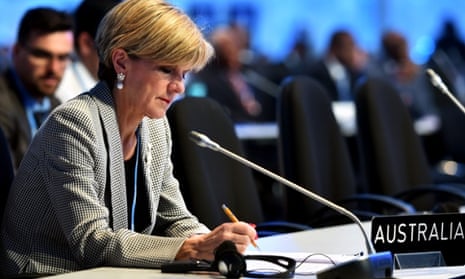

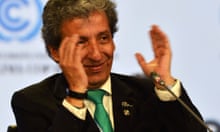

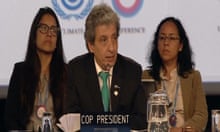
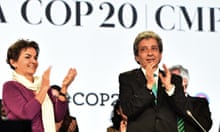

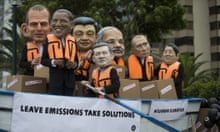

Comments (…)
Sign in or create your Guardian account to join the discussion